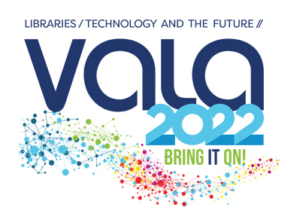Embracing asynchronous online learning
VALA2022 E-Poster
Jaime Royals
- Senior Manager, Collections and Access Services
- University of Adelaide
Please tag your comments, tweets, and blog posts about this session: #vala2022
Abstract
Imagine the librarian standing in front of a lecture theatre posed to deliver a session on information literacy. Wait a minute, when was this? 2020. No that wouldn’t happen, because it conflicts with the Learning and Teaching Principles (plus we had Covid)!
Libraries are moving away from this style of teaching. In 2019 The University of Adelaide Library responded to this shift away from face to face teaching by developing and implementing a set of learning and teaching principles, which well positioned the Academic Liaison team to embrace an online teaching model.
The six principles – relevance, collaboration, innovation, evaluation, accessibility and flexibility – align the Library’s information literacy teaching with the strategic direction of the University and ensure a consistent approach to decision making, design and facilitation of learning and teaching activity across the Library.
The principles advocate for students to be taught transferrable information skills, relevant to both study and employability. The content is developed in partnership with teaching academics and other stakeholders, and also with students, providing them with the opportunity to actively contribute to the creation of their own learning material. Under the principles all students have equitable access to information literacy skills training, with content distributed online, supporting ease of discovery and self-directed learning, using content in a personalised, just-in-time and proactive manner. Innovation is encouraged in content creation with a range of high-quality learning objects. Finally, the content is regularly evaluated and reviewed, based on student input and learning analytics.
Implementing the principles represented a significant cultural shift for the Academic Liaison team who are responsible for the majority of information literacy training. The team’s relationships with teaching academics transitioned from the role of service provider to collaborative partner who could provide specialist advice on how best to integrate information literacy skills into courses.
The Academic Liaison team were involved in a series of upskilling sessions that provided them with the confidence to move from face-to-face to online teaching. These sessions included pedagogical best practice, writing learning objectives and assessments, best practice in multimedia design and system specific training including Canvas and h5p. Resources including a style guide and workflow for developing digital learning objects, a framework for user experience testing and peer review (including by students) and a database to manage the process of reviewing, evaluating and continuously improving learning objects, enabled the development of high-quality content.
It is a testament to the benefits of this approach that the majority of information literacy training is now provided online and the team are increasingly confident in advocating for this best practice partnership model.
This poster will provide an overview of the six principles, detail how and why the principles were developed, outline the supporting resources developed for implementation, alongside examples of feedback from teaching staff and students.
Biography
 Jaime Royals is currently the Senior Manager, Collections & Access Services at the University of Adelaide. Jaime has worked in several roles at the University Library including as a Liaison Librarian and as the Manager of Learning and Teaching Innovation. She has a keen interest in developing and innovating library services in collaboration with stakeholders, in line with best practice and with an evidence-based approach. She is also partial to terrible dad jokes!
Jaime Royals is currently the Senior Manager, Collections & Access Services at the University of Adelaide. Jaime has worked in several roles at the University Library including as a Liaison Librarian and as the Manager of Learning and Teaching Innovation. She has a keen interest in developing and innovating library services in collaboration with stakeholders, in line with best practice and with an evidence-based approach. She is also partial to terrible dad jokes!
![]()
This work is licensed under a Creative Commons Attribution-NonCommercial-NoDerivs 3.0 Unported License

